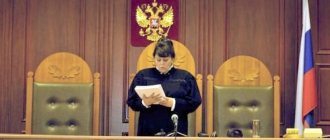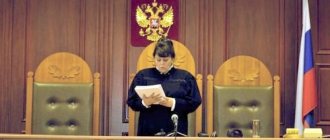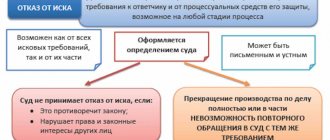Obtaining a court order is an accelerated and simplified procedure for debt collection. In writ proceedings, the debtor cannot challenge the claimant's claims on the merits, refer to missed statutes of limitations or other circumstances. Moreover, due to the simplified procedure, many debtors learn about the existence of an order after the funds are actually written off.
In such cases, it is possible to obtain the cancellation of the issued order to stop the collection. To do this, you need to file an objection or cassation appeal. Based on the results of consideration of objections or complaints, it is possible to reverse the court order, which will allow the recovered money to be returned.
In what cases do they write
The current legislation provides for a procedure for appealing court decisions that have entered into force.
In this case, sometimes a situation arises where it is actually executed, and subsequently loses its legal force. The judicial authority is obliged, on its own initiative or at the request of the defendant, to consider the issue of reversing the execution and oblige the plaintiff to return everything received under the canceled decision. Including reimbursed expenses for representation services (in accordance with current law enforcement practice). These rules also apply to a court order. If the order issued and already executed is cancelled, a statement is written to reverse the court order in order to return everything collected or voluntarily transferred. The institution of reversal is intended to return the parties to their original state and correct the mistakes of the courts. The procedure is regulated in Art. 443-445 Code of Civil Procedure of the Russian Federation. An appeal is submitted to the court of first instance or the magistrate who issued the order or decision.
Get free access to ConsultantPlus instructions and samples, which will be useful to turn your business around.
Application to reverse the execution of a court order
The court will make a positive ruling on the reversal of the judicial act if the following key conditions are met:
- the court's order on the writ of certiorari was quashed;
- funds from the debtor are transferred to the collector;
- the claimant did not file a claim on the same grounds.
If the above conditions are met, you can be confident in the positive outcome of the case and begin preparing the application itself. It must indicate:
- name of the court and case number;
- information about the persons participating in the case;
- a detailed statement of the applicant's position.
- documents on which the requirements are based.
The submitted document must be signed, dated and have attachments confirming the stated requirements. All documents are submitted in copies for the court and the parties. The arbitration process provides for the advance sending of a copy of the application with attachments to the claimant.
HEALTHY:
How to write correctly
The Code of Civil Procedure of the Russian Federation does not indicate what requirements the application must meet or what details are included in it. In practice, the same form is used as for a claim.
What to include in the application:
- name of the court, details of the defendant (debtor) with address and telephone number in the header. It is not necessary to indicate the plaintiff’s details;
- case number;
- Title of the document;
- in the descriptive part, list the circumstances of the case, indicate the reversal of the decision with details of all judicial acts. It is also necessary to indicate complete or partial execution;
- a request to reverse the execution and return the collected or transferred property;
- list of attachments (judicial acts, copies of evidence of collection or voluntary transfer of funds or other property);
- date and signature. These are mandatory details; without a handwritten signature, procedural documents are invalid.
A representative has the right to act on behalf of the defendant; then a copy of the power of attorney must be attached. A power of attorney on behalf of a citizen does not have to be notarized; the applicant - an individual has the right to have his signature certified by a management company or a housing cooperative or homeowners' association.
This application is not subject to state duty, since its payment in this case is not provided for in the Tax Code of the Russian Federation. The state fee is paid when filing claims or complaints. The appeal is being considered in court. The applicant and interested parties are notified, but they are not required to appear. It is possible to file a private complaint against the decision to turn within 15 days. When filing, it is necessary to comply with the three-year limitation period from the moment the court decision was cancelled, although this is not expressly stated in the Code of Civil Procedure of the Russian Federation, in practice the limitation period is applied by judges.
The Code provides for several ways to submit procedural documents: by mail (registered mail with notification), through the office with an incoming stamp, through the GAS Justice or My Arbitrator systems online.
Sample
| To the Petrogradsky District Court of St. Petersburg from Limited Liability Company "Ppt.ru" 456789, Russia, Subject of the Russian Federation, prosp. Wonderful, no. 1 Case No. 123/2019 STATEMENT about the turn of execution By the decision of the Petrogradsky District Court dated May 25, 2019 in civil case No. 123/2019 on the claim of N.N. Kedrov. 20,000 (Twenty thousand) rubles were recovered from Ppt.ru LLC regarding the collection of debt under a service agreement. The court decision dated May 25, 2019 in case No. 123/2019 was executed in full, 20,000 (Twenty thousand) rubles were written off from the account of Ppt.ru LLC on December 25, 2019. On August 25, 2021, this act was canceled by the St. Petersburg City Court. During a new consideration of the case, a ruling was made that established the absence of grounds for recognizing the services as provided. Based on the above, guided by Articles 443, 444, 445 of the Civil Procedure Code of the Russian Federation, Ask: Since the higher authority, which again considered case No. 123/2019, did not resolve the issue of returning the funds paid, I ask you to issue a ruling on the reversal of execution and return to Ppt.ru LLC 20,000 (Twenty thousand) rubles recovered in favor of the plaintiff N.N. Kedrov . in case No. 123/2019. List of applications:
Submission date September 20, 2021 Signature _______ |
Analytics Analytical reviews
(Decision of the Supreme Court of the Russian Federation dated May 16, 2016 in case No. 309-ES15-19396, A60-58232/2014)
According to Part 1 of Article 325 of the Arbitration Procedure Code of the Russian Federation, if the executed judicial act is canceled in whole or in part and a new judicial act is adopted on the full or partial refusal of the claim, or the claim is left without consideration, or the proceedings are terminated, the defendant is returned everything that was recovered from him in favor of the plaintiff according to the judicial act that was canceled or amended in the relevant part.
In the process of application of this rule of law by the courts, questions arose related to the calculation of interest for the use of funds in the case when these funds were transferred to the plaintiff after the entry into force of a judicial act[1], but subsequently the judicial act was canceled by way of cassation appeal.
Is it possible in such a case to talk about the groundlessness of the plaintiff’s receipt of funds? Does the plaintiff bear the risk of collecting interest from him when presenting a writ of execution for execution before the cassation court announces its position on the merits of the dispute?
Answers to these questions were received when the court resolved a specific dispute in case No. A60-58232/2014.
Consideration of case No. A60-58232/2014
By the decision of the Arbitration Court of the Perm Territory dated October 24, 2012 in case No. A50-21303/2011, upheld by the decision of the appeal court dated January 15, 2013, the claim of IDGC of the Urals OJSC against TGC No. 9 OJSC (hereinafter referred to as the Company) for recovery was satisfied RUR 523,656,174.28 debt.
IDGC of Urals OJSC according to the writ of execution with 14.03.2013
[2] by 04/25/2013 received 14,130,858.43 rubles from the Company.
By a resolution of the Arbitration Court of the Ural District dated May 23, 2013, the decision of the court of first instance and the appeal ruling were canceled, case No. A50-21303/2011 was sent for a new trial to the arbitration court of first instance.
Upon a new consideration, the court of first instance, by decision dated September 11, 2013, refused to satisfy the claim, reversed the execution of the canceled judicial act and (taking into account the additional decision dated October 14, 2013) recovered 64,130 from IDGC of the Urals OJSC in favor of TGC No. 9 OJSC RUB 858.43
IDGC of the Urals OJSC transferred 50,000,000 rubles to TGC No. 9 OJSC. according to payment order dated October 8, 2013 No. 509.
On December 28, 2013, by the decision of the Seventeenth Arbitration Court of Appeal, the decision of September 11, 2013 was left unchanged.
01/09/2014 and 01/10/2014[3] IDGC of Urals, OJSC transferred the remaining funds to the Company.
The Federal Arbitration Court of the Ural District, by its resolution dated April 16, 2014, left the decision of the trial court and the appeal ruling in case No. A50-21303/2011 unchanged.
The reason for filing a claim in court in this case was the use by OAO IDGC of the Urals of funds belonging to OAO TGC No. 9 in the amount of 114,130,858.43 rubles. due to their unjustified receipt.
The company demanded to recover 5,865,000.46 rubles from IDGC of the Urals OJSC. interest for the use of other people's funds based on a refinancing rate of 8.25% per annum from the day the funds were received under writs of execution until the day they were returned, that is, from 03/14/2013 to 01/10/2014.
By the decision of the court of first instance dated April 15, 2015, left unchanged by the decisions of the appellate and district courts dated July 2, 2015 and October 12, 2015, the claim was satisfied.
The courts proceeded from the fact that, by presenting for collection a writ of execution obtained on the basis of a decision that had entered into legal force in a case in which all legal remedies had not been exhausted, IDGC of Urals, OJSC bore the risk of paying interest for the use of other people's funds ,
the possibility of reclaiming which arose when the said decision was canceled by a higher court.
The courts also referred to the legal position of the European Court of Human Rights, according to which the basis for the enforcement of a judicial act is a final court decision that has entered into legal force (the principle of res judicata), indicating the formation of legal certainty on a controversial issue (decision of the European Court of Human Rights person on the issue of admissibility of complaint No. 42600/05 “LLC LINK OIL SPb against the Russian Federation” dated June 25, 2009).
Since, according to the lower courts, before the case is considered by way of cassation appeal, judicial acts in any case cannot be considered final, the claimant must seek forced execution of the judicial act only after passing through all judicial instances.
Thus, the courts of lower instances have formed a legal position according to which the use of funds transferred in a case in which all legal remedies have not been exhausted (cassation appeal, supervisory appeal) entails for the collector the risk of accrual of interest if the judicial act is canceled by the courts higher authorities.
Next, IDGC of Urals OJSC filed a cassation appeal with the Supreme Court of the Russian Federation, citing a significant violation by the courts of appeal and cassation of substantive law in determining the amount of the penalty to be collected from the violator of the obligation.
The applicant’s position when filing a complaint with the Supreme Court of the Russian Federation
- A court decision and a writ of execution that has entered into legal force are sufficient grounds for receiving funds based on them and for using them until a judicial act on the opposite decision and a reversal of the execution of a previously adopted decision enters into legal force.
- Interest under Article 395 of the Civil Code of the Russian Federation must be accrued from the moment the judicial act on the basis of which it was collected is canceled.
Position of the Supreme Court of the Russian Federation
When adopting a judicial act, the Judicial Collegium for Economic Disputes proceeded from the following:
- In accordance with Article 1107 of the Civil Code of the Russian Federation, a person who unjustly received or saved property is obliged to return or compensate to the victim all the income that he received or should have received from this property from the time he learned or should have learned about the unjustified enrichment. Interest is subject to accrual on the amount of unjust monetary enrichment for the use of someone else's funds from the time when the acquirer learned or should have learned about the unjustification of receiving or saving money.
- For the use of someone else's funds as a result of their unlawful retention, evasion of their return, other delay in their payment, or unjustified receipt or savings at the expense of another person, interest on the amount of these funds is subject to payment (Article 395 of the Civil Code of the Russian Federation).
- As a general rule, interest is accrued on a sum of money collected on the basis of a judicial act from the moment the final judicial act enters into force (clause 2 of Article 1107 of the Civil Code of the Russian Federation).
- At the same time, taking into account the circumstances of a particular case, for example, if there was falsification of evidence and this led to the adoption of a decision that served as the basis for the transfer of funds, interest may be accrued from an earlier point, for example, from the moment funds are credited to the bank account of the unscrupulous creditor
(clauses 3, 4 of article 1, clause 2 of article 1107 of the Civil Code of the Russian Federation).
- The final judicial act in this case was the appeal ruling dated December 28, 2013, since from that moment the court decision dated September 11, 2013, which finally resolved the dispute, came into force and was subject to enforcement (Articles 318, 325 of the Arbitration Procedure Code of the Russian Federation).
- Based on the fact that the courts did not qualify any actions of IDGC of Urals, OJSC as an abuse of their rights
, there is no unjust enrichment on the part of the claimant.
Based on the results of the consideration of the case, the judicial acts of the courts of first, appellate and cassation instances were canceled, the case was sent for a new trial to the Arbitration Court of the Perm Territory.
In conclusion, I would like to emphasize that the conclusions of the Supreme Court of the Russian Federation, set out during the consideration of case No. A60-58232/2014, can be used in practice in order to exclude the possible accrual of interest for the use of funds after the presentation of a writ of execution immediately after the entry into legal force of the court act of collection of funds.
A different approach would lead to the creation of legal uncertainty regarding the possible moment of presenting a writ of execution for execution and would definitely delay the collection of debts in favor of bona fide plaintiffs.
[1] That is, from the moment the decision of the appellate court is issued in full.
[2] The start date for the accrual of interest, in the opinion of the Company.
[3] The expiration date for the accrual of interest, in the opinion of the Company.
Terms of consideration
The Code of Civil Procedure of the Russian Federation does not specify the time frame for considering an application to reverse a court decision. In accordance with Art. 6.1 of the Code of Civil Procedure, legal proceedings are carried out within a reasonable time, determined on the basis of the complexity of the case and the availability of the participants in the process. The workload of judges is not taken into account. The parties to the case have the right to apply to speed up the proceedings if they believe that the consideration of the case is being unreasonably delayed. The procedure is designed to quickly resolve contradictions and protect the rights of the parties to the case, so the appeal must be considered promptly.






